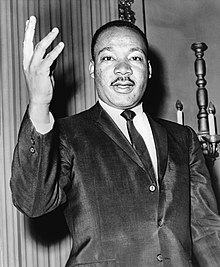Welcome to DU!
The truly grassroots left-of-center political community where regular people, not algorithms, drive the discussions and set the standards.
Join the community:
Create a free account
Support DU (and get rid of ads!):
Become a Star Member
Latest Breaking News
Editorials & Other Articles
General Discussion
The DU Lounge
All Forums
Issue Forums
Culture Forums
Alliance Forums
Region Forums
Support Forums
Help & Search
General Discussion
Related: Editorials & Other Articles, Issue Forums, Alliance Forums, Region ForumsSome random clipping about Martin Luther King Jr. in Wikipedia

Martin Luther King, Jr. (January 15, 1929 – April 4, 1968) was an American Baptist minister, activist, humanitarian, and leader in the African-American Civil Rights Movement. He is best known for his role in the advancement of civil rights using nonviolent civil disobedience based on his Christian beliefs.
On October 14, 1964, King received the Nobel Peace Prize for combating racial inequality through nonviolence.
Nonviolence
Veteran African-American civil rights activist Bayard Rustin was King's first regular advisor on nonviolence.[36] King was also advised by the white activists Harris Wofford and Glenn Smiley.[37] Rustin and Smiley came from the Christian pacifist tradition, and Wofford and Rustin both studied Gandhi's teachings. Rustin had applied nonviolence with the Journey of Reconciliation campaign in the 1940s,[38] and Wofford had been promoting Gandhism to Southern blacks since the early 1950s.[37] King had initially known little about Gandhi and rarely used the term "nonviolence" during his early years of activism in the early 1950s. King initially believed in and practiced self-defense, even obtaining guns in his household as a means of defense against possible attackers. The pacifists guided King by showing him the alternative of nonviolent resistance, arguing that this would be a better means to accomplish his goals of civil rights than self-defense. King then vowed to no longer personally use arms.[39][40]
In the aftermath of the boycott, King wrote Stride Toward Freedom, which included the chapter Pilgrimage to Nonviolence. King outlined his understanding of nonviolence, which seeks to win an opponent to friendship, rather than to humiliate or defeat him. The chapter draws from an address by Wofford, with Rustin and Stanley Levison also providing guidance and ghostwriting.[41]
Inspired by Mahatma Gandhi's success with nonviolent activism, King had "for a long time ... wanted to take a trip to India".[42] With assistance from Harris Wofford, the American Friends Service Committee, and other supporters, he was able to fund the journey in April 1959.[43] [44] The trip to India affected King, deepening his understanding of nonviolent resistance and his commitment to America's struggle for civil rights. In a radio address made during his final evening in India, King reflected, "Since being in India, I am more convinced than ever before that the method of nonviolent resistance is the most potent weapon available to oppressed people in their struggle for justice and human dignity".
Bayard Rustin's open homosexuality, support of democratic socialism, and his former ties to the Communist Party USA caused many white and African-American leaders to demand King distance himself from Rustin,[45] which King agreed to do.[46] However, King agreed that Rustin should be one of the main organizers of the 1963 March on Washington.[47]
King's admiration of Gandhi's nonviolence did not diminish in later years. He went so far as to hold up his example when receiving the Nobel Peace Prize in 1964, hailing the "successful precedent" of using nonviolence "in a magnificent way by Mohandas K. Gandhi to challenge the might of the British Empire ... He struggled only with the weapons of truth, soul force, non-injury and courage."[48]
Gandhi seemed to have influenced him with certain moral principles,[49] though Gandhi himself had been influenced by The Kingdom of God Is Within You, a nonviolent classic written by Christian anarchist Leo Tolstoy. In turn, both Gandhi and Martin Luther King had read Tolstoy, and King, Gandhi and Tolstoy had been strongly influenced by Jesus' Sermon on the Mount. King quoted Tolstoy's War and Peace in 1959.[50]
Another influence for King's nonviolent method was Henry David Thoreau's essay On Civil Disobedience, which King read in his student days. He was influenced by the idea of refusing to cooperate with an evil system.[51] He also was greatly influenced by the works of Protestant theologians Reinhold Niebuhr and Paul Tillich,[52] as well as Walter Rauschenbusch's Christianity and the Social Crisis. King also sometimes used the concept of "agape" (brotherly Christian love).[53] However, after 1960, he ceased employing it in his writings.[54]
Even after renouncing his personal use of guns, King had a complex relationship with the phenomenon of self-defense in the movement. He publicly discouraged it as a widespread practice, but acknowledged that it was sometimes necessary.[55] Throughout his career King was frequently protected by other civil rights activists who carried arms, such as Colonel Stone Johnson,[56] Robert Hayling, and the Deacons for Defense and Justice.[57][58]
Snip
https://en.wikipedia.org/wiki/Martin_Luther_King,_Jr.
